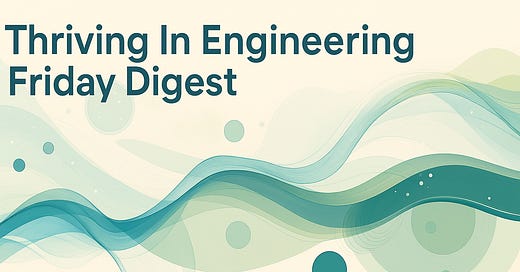Leading in tech means juggling people, priorities, and pace – which rarely leaves room to stay up to date.
That’s why I curate the most useful, thought-provoking reads each week, so you don’t have to. This edition is packed with insights on AI, leadership mindsets, technical influence, and real-world team dynamics.
Let’s get into it.
1 - How AI Is Transforming Engineering Documentation
Imagine an AI capable of understanding any programming language and generating documentation seamlessly. This reality is closer than ever and challenges the traditional role of engineering documentation.
Luca Rossi examines this shift, suggesting we rethink documentation from a lifecycle perspective, focusing on recording essential decisions and simplifying retrieval processes. The newsletter highlights the paradox where AI makes some documentation obsolete while amplifying the importance of others, such as business context and decision logs. Rossi also shares insights from Dennis Pilarinos, emphasizing that top-level decision and purpose docs remain crucial.
Main Takeaway:
While AI can automate the creation and updating of “how” documentation, the “why” documentation – context and decisions – remains a critical human domain.
Why It Matters:
Engineering leaders must evolve documentation practices to leverage AI effectively, ensuring that high-value strategic information is captured and accessible, while automating more routine aspects.
Read This If You’re Interested In:
Discover why traditional documentation fails engineers
Learn how to balance AI and human input in documentation
Understand the importance of decision and context documentation
Explore innovative workflows for AI-enhanced documentation
Adapt to the future of dynamic, AI-integrated knowledge management
2 - The Software Engineering Squeeze: A Call for Skill and Passion
Anton Zaides delves into the idea that software engineering, once a highly sought-after and lucrative career path, is becoming increasingly competitive. As the industry expands, the demand for exceptional engineers grows, leaving a “fat middle layer of mediocre engineers” squeezed out.
Zaides compares the software field to others, highlighting the ease of change given basic analytical skills, unlike the difficulty of professions such as medicine. The rising publicity around job losses due to AI and economic changes adds pressure, yet Zaides asserts that great engineers don't fear these developments because their positions involve more than just coding.
He calls attention to the need for continuous skill advancement and a genuine passion for the work, noting that many engineers have grown complacent, avoiding legacy code, unclear requirements, or work after hours. The piece concludes with a challenge: active engagement and problem-solving with AI tools and a focus on broad skills across engineering, project management, and design are now essential to thrive.
Main Takeaway:
The software industry no longer tolerates mediocrity – engineers must be proactive, continuously learn, and truly invest in their roles to remain irreplaceable.
Why It Matters:
With increasing automation and high market volatility, engineering leaders must drive their teams towards improvement, nurturing those who are willing and able to adapt and contribute tangibly beyond basic coding.
Read This If You’re Interested In:
Leading teams through technological disruption
Encouraging self-improvement within engineering roles
Understanding the shifting demands of the software industry
Mentoring developers toward broader skill sets
Promoting practical application of AI tools
Keep reading with a 7-day free trial
Subscribe to Thriving In Engineering to keep reading this post and get 7 days of free access to the full post archives.





